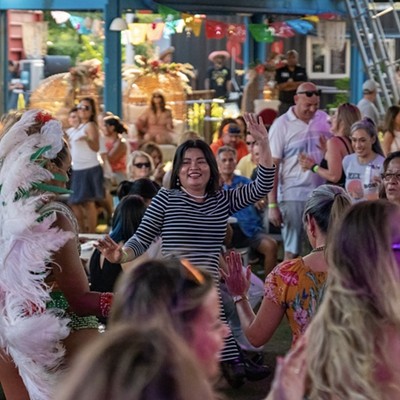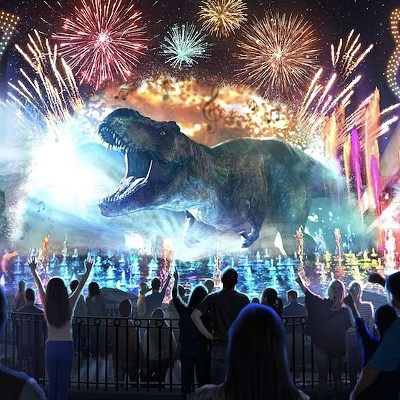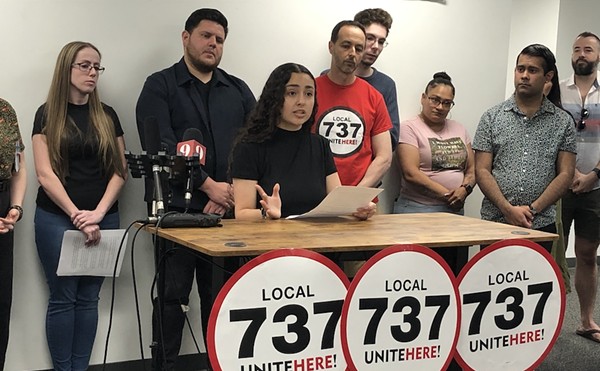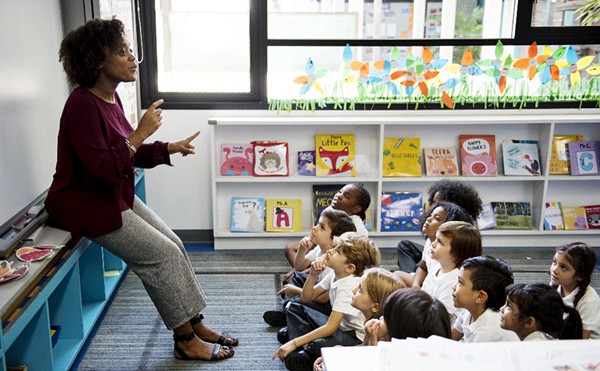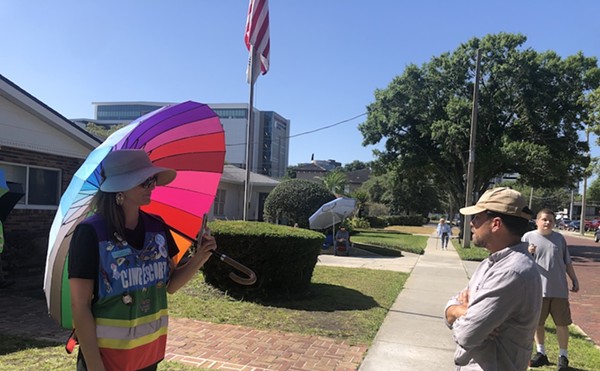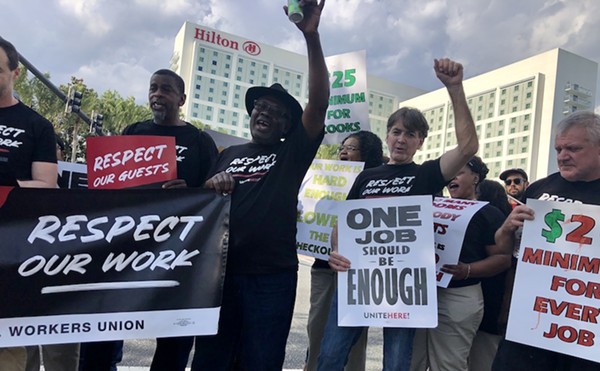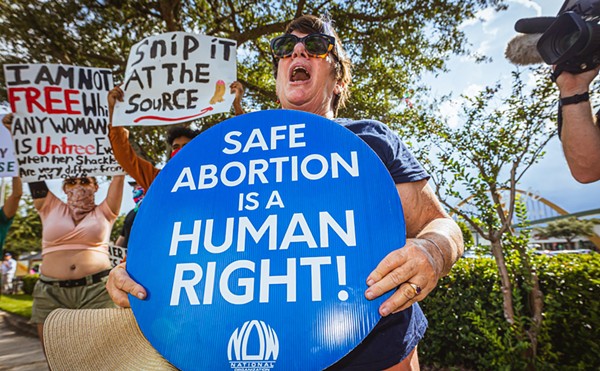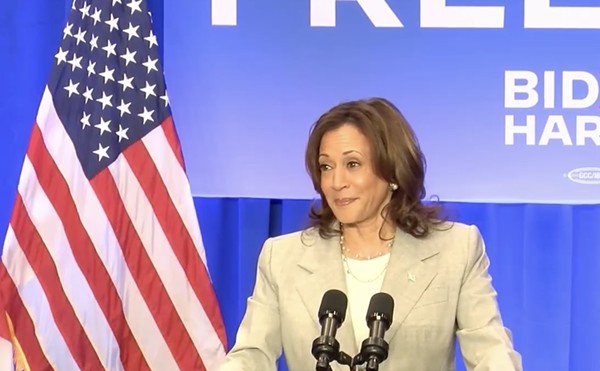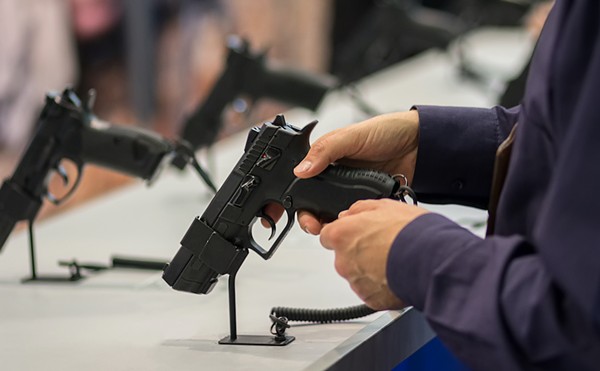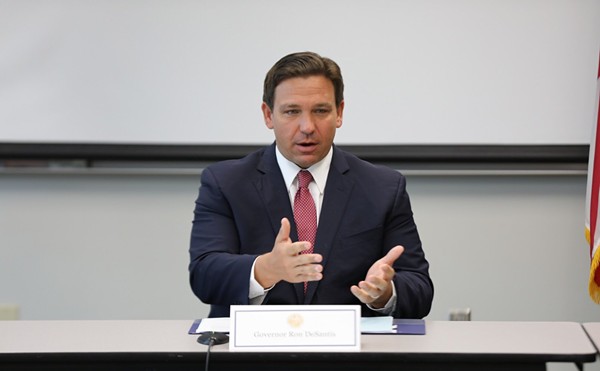For many workers at Disney World, every day is Gay Day
He doesn't want his name used, but it's not because he doesn't want his co-workers to know he's gay; they've known that since he started working at Walt Disney World in the mid-1980s.
But he's risen far enough in management to know that he's not supposed to talk to the media, that to breach his company's confidence is to risk censure. Indeed, few companies are as skittish about image as Disney -- even the post-"Ellen," post-Baptist boycott Disney -- and they zealously guard who in the company speaks and how they say it. And so he has agreed to speak anonymously, in that tradition that promises something secretive, something revelatory, something he doesn't dare say for attribution because, well, it's too juicy.
But what he says isn't juicy at all.
He loves his job.
He loves his job.
He loves his employer.
He loves them both, in part, because Disney is a place where he can work and be himself: a gay man and, in the vernacular, "out" about it.
Disney should put this guy on a recruiting poster.
Then again, they don't have to.
"Being gay to me as far as Disney was concerned wasn't a plus or a minus; it was a given" says Bill MacKellar-Hertan, Disney World's former manager of diversity planning and administration, now with ABC in New York. "I wasn't looking for an organization that specifically was open to gays and lesbians, but certainly had I experienced Disney as a company that was not accepting, I wouldn't have considered the job. My experience with Disney was, just being who I was, was absolutely acceptable."
Numbers are impossible to come by, whether overall at The Walt Disney Co. or among any sizeable workforce; although subject to endless and often contentious debate, matters of sexual orientation still are not required to be listed on job application forms.
But it's a locally accepted truism that gays and lesbians complement Disney World's 35,000-member workforce in larger-than-average numbers. Anecdotal evidence backs it up. And as transient anti-gay protesters storm the city to confront thousands flocking here to join in the eighth annual staging of grass-roots events collectively known as Gay Days, it's notable that for gays and lesbians who punch the clock, Disney World may indeed be The Happiest Place on Earth.
"More times than not it's become a situation where I'll consider everybody gay until they come out straight," says Denis Gawley, an actor in Epcot's Futureworld who relocated from New York City in January. "There's certainly an open environment that is accepting, which has been very pleasant so far. If anything, Disney seems to stress diversity, and being gay certainly falls within that realm."
Confirms Ed Mickens, author of the book "100 Best Companies for Gay Men and Lesbians": "Disney has turned out to be one of the absolutely best role models because they're just concentrating on their business and not telling their customers or their employees how to run their lives."
It wasn't always so.
"It was all happening as I was doing my book," says Mickens, whose resource guide came out in 1994. "I really think that Disney was by nature a gay-friendly company. And of course we're talking about a huge conglomerate ... there were some sections that were doing very badly by my scale, and some that were superlative."
That scale had three core criteria: a clear company policy of nondiscrimination that included sexual orientation (which Disney has); education efforts within the ranks to address sexual orientation among both employees and customers (which Disney was then developing); and a program extending standard company benefits to same-sex partners (which Disney was starting to explore and has since fully embraced -- although they were the last major Hollywood studio to do so).
At the time of his research, Mickens says, Disney was "struggling with the image of themselves as a family entertainment purveyor, and whether or not acknowledging that the gay and lesbian component among their employees was consistent with that. For a while they were actually terrified of that.
"And then they broke though," he says. "Everything happened very quickly once they got over that fear -- which, in a way, is the fear of exactly what is happening this week."
ABC, which Disney officially acquired in 1996, did not make Mickens' cut. "They were being extremely secretive and didn't want to talk to me," he says of the broadcast network. "This is a fear that affects a lot of companies. I had a lot I was talking to who never made my book because they got too caught up in their fear; they actually were doing good things `but` didn't want to talk about it."
Those forward steps at Disney are easily recalled because of the atmosphere that they replaced.
The anonymous operations manager -- one of several employees at all levels who spoke on the condition that their names not be used -- remembers that earlier time. For example, it was widely repeated within the ranks that one former Magic Kingdom administrator refused to assign men to an administrative desk that took incoming calls because, as the story went, he had said, "I won't have any faggots answering my phones." And for the first years of the unsanctioned Gay Day that took root at the Magic Kingdom in 1990, it was those same park execs who erected signs at the entrance alerting guests that homosexuals were gathering inside.
Says another manager who recalls the early '80s: "At the time there was an awareness that gays and lesbians worked there," most in lower-paid hourly jobs that put them in direct contact with guests. "There was a tolerance of those cast members as long as the guests couldn't perceive that they might be openly gay."
He adds: "The management team at the time wasn't as comfortable with it. They were raised on a different set of rules, and that impacted the way they reacted to the ‘out' cast members.
"In the years since then, not only has the culture shifted, but as Michael Eisner came in, he moved some of the upper management around, and eventually within the past couple of years moved some of them into retirement. It's allowed more acceptance because some of the more liberal-minded folks are moving into the upper ranks."
Two of those now gone are Bill Sullivan and Bob Matheison, whose retirements were announced together in January 1994. "Sully," who was then executive vice president for the Magic Kingdom, started with Disney as a ticket-taker at Disneyland in 1955; Matheison, then executive vice president for parks, had been with the company since 1960.
Sullivan was replaced by Greg Emmer, who moved over from Epcot. And with Gay Day in particular, "the whole cycle started changing," the manager says. Then, in 1995, the warning signs disappeared.
"The response `to anti-gay complaints` has always been that everybody is entitled to enter our theme parks; we do not discriminate against anyone," says the manager. "Under ‘Sully,' we were saying that, but we didn't mean it. Under Greg Emmer, we mean it."
Moreover, on Gay Day, Emmer has been seen joining in the cheers that bounce back and forth between groups as participants congregate in front of Cinderella's Castle in the moments before the afternoon parade. "That takes a whole lot for a company exec to take time and go out there and be a part of that," the manager says. "Whether or not he has personal biases toward gay and lesbian people, he doesn't show it."
Fredricka Howard, Disney World's director of diversity, says gays and lesbians are just part of the fabric in training where "we really are focused on retaining a culture that respects, cultivates and values" differences. At the moment, those efforts are focused on disability issues -- not just guests' disabilities but also on disabilities affecting other workers, who are brought in to share their experiences with their peers, she says. Recently the company also observed Asian-Pacific-American heritage month, complete with employee seminars and specialty entrees at employee cafeterias. And there's Black History Month, American Indian month, Kwanzaa -- the list goes on, though not to include Gay Pride.
"There are gays and lesbians in every one of those cultures," offers Stan Berry, a manager in Magic Kingdom merchandising who is gay. "By them not singling us out, they're not discriminating against us."
He continues: "If I worked for another company, I know `gays and lesbians` would be out there, but not so open. I would be intimidated, thinking, ‘I've got to act straight.' Here I can just be myself. ... The homophobes basically stay away from me, because they know who I am and what I am."
But they're there?
But they're there?
"Oh yeah. It's up to me and the other gay and lesbian cast members to change their mind." And on Gay Day, he says, "if somebody is not comfortable with it, it's like, ‘You're going to have to put aside your differences for this one day. You're at work; you're representing the Disney company; you're not representing your own views right now. You need to relax.'"
But acceptance and empowerment are not the same thing. In the late '80s and early '90s, when a gay employees alliance took root, Disney helped spread the word but remained watchful of its purpose. Members were conflicted. Some wanted a social club. Some wanted the equivalent of a grievance committee to filter concerns to management. "We sort of became at odds with ourselves," says one participant. When the leadership finally pushed a more active role, they "probably stepped out in an area that was not appropriate for the company -- either for the company or for the members of the group." The alliance faded away.
Within the past year a new group has emerged in its place. Called LEAGUE (Lesbian and Gay United Employees) at Lake Buena Vista -- after two similarly titled groups at Disneyland and Disney's California studios -- it currently is struggling with some similar issues. Most pressing, though, is its exact relationship to Disney, says Charles Cantrell, its co-chairman. The Cast Activities office, which oversees LEAGUE (along with employee clubs for fishing, singing, amateur radio enthusiasts, the hard-of-hearing and Christian fellowship), has ordered several revisions in a planned LEAGUE brochure, all of them apparently designed to put distance between the group and its corporate identity. "The biggest problem at first was the word ‘Disney,'" says Cantrell. "We could not mention it anywhere. The biggest one last time was in a section of LEAGUE history" -- specifically, the reference to the Anaheim group as a liaison for "labor relations."
"They won't give us a reason," he says. "They just don't want that there."
It's easy to see why. Currently 21 unions are represented on Disney property, with about 20,000 employees -- half of them union members -- covered by bargaining agreements negotiated for one of the six unions that make up the Services Trades Council. Not until 1994 did Disney and the council add sexual orientation to its categories of protected classes. But elsewhere across the country, a constituency group of the AFL-CIO called Pride at Work seeks to draw workers together on matters of concern to gays and lesbians. That hasn't happened here. But advocacy groups are always in the wings. "There are efforts currently afoot within the company's minority communities to start having affinity groups" that might play such a role, says one gay manager.
But just as important would seem to be the example that "out" individuals provide as role models. "In the areas where I've been working there's an atmosphere not just of tolerance but of acceptance," he says. "The heterosexuals who work with us are part of our family, just as we are part of theirs. Being in middle-management and ‘out' allows the hourly cast members to feel more confident that there won't be discrimination against them in the company, that you can move up and be ‘out.' That's the message I try to send in a subtle way by being who I am."
Adds Richard Rasi, co-editor of "Out in the Workplace: The Pleasures and Perils of Coming Out at Work": "Disney's effect is multigenerational. They're involved in the education and entertainment of people at every single level of growth.
"For them to be inclusive and to be a role model for the rest of society in this way, it just makes a lot of sense."
The party pays off
Last year, local AIDS service groups were left out of the fund-raising bonanza created by the crush of parties staged around Gay Days, leaving the cash raised at benefit events to outside organizations `"Kingdom Come," June 5, 1996`. This year, some of the bounty finally will stay in Orlando, as Hope & Help of Central Florida and CENTAUR join in high-profile fund-raisers.
But the Orlando-based AIDS Resource Alliance again has chosen not to align itself with events tailored to gays and lesbians. "We're not fund-raising," says Caroline Gertz, ARA's executive director, adding that her agency felt the money should support groups such as Gay and Lesbian Community Services of Central Florida. "They need the money. That's their day."
Last year, CENTAUR declined to loan its name to an outside promoter. On Sunday, June 7, CENTAUR will benefit from three brunches held at the House of Blues and promoted by Russ Crumley. "We've had a long relationship with Russ. He's doing all the work," says Russell Scott of CENTAUR. Yet he echoed Gertz's misgivings; after all, he says, CENTAUR is an AIDS organization, not a gay and lesbian organization.
"Part of our job is to educate," Scott says, pointing to the still-popular misconception that AIDS only affects gay men, although half of CENTAUR clients are heterosexuals. "There's a sensitivity to see that not all our events are over-the-top gay events. Our message is, we serve everyone."
Hope & Help figures to enjoy a windfall from several nightclub events, as well as the sale of a musical cassette of songs parodying the Southern Baptist boycott of Disney and the Operation Rescue protests of this year's events. "We feel really fortunate that our community partners took a stand to see that some of the money stays in the area," says Mary Beth Fleck, Hope & Help's development director, noting that the gay community has supported AIDS organizations for a decade. "It's not one or the other," she says. "We're in this together."


